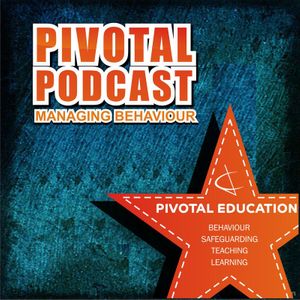Tony Meehan – Working in the shadow of Grenfell – PP200
Pivotal Podcast - A podcast by Pivotal Education

Categories:
Paul met Tony for the first time as part of the TBAP Multi-Academy Trust. He is a headteacher, a consultant, Founding Fellow of the Chartered College of Teaching and an expert in working with some of the most vulnerable “and damaged young people. What do teachers most often get wrong when dealing with the most challenging behaviour? Tony believes that bad practice in behaviour management is typified by people who feel they need to fix things then and there, before things escalate without really taking on board what’s really going on. Staff who harangue individuals and are ‘loose with language’. “If they just tell them several times in different tones, louder and louder, it’ll fix it up – and it doesn’t.” Being loose with language is dangerous because it risks sending a child into a spiral where behaviour gets worse. What’s the best practice you have ever witnessed? Tony tells the story of seeing a brilliant practitioner in a PRU reacting to a learner who stated that he was going to ‘trash the place.’ The teacher said, “OK, hun, but just don’t hurt yourself while you’;re doing it.” She then carried on as if nothing else was happening. This is, Tony tells us, incredibly powerful use of language and shows the demeanour of the teacher and the strength of her relationships. “When a member of staff is at ease with themselves, secure in their own skin, pupils sense that.” * Use language * Use humour * Make pupils feel they are important “You have to love the job and your pupils in order to do the job we do because it’s incredibly intense.” Another example of this is the girl from an incredibly difficult home situation who was often absent form the PRU for extended periods. When she re-appeared after being missing for a week, the staff all reacted in the same way. No-one asked where she had been – they all exclaimed her name, welcomed her back and gave her hugs. The result of this is when at leavers’ day, the pupil is sitting in the event, having done all her GCSEs – and her mum is sitting next to her, as Tony puts it ‘in utter pride’. This, for Tony, is what the job is all about. How can a leader in Alternative Provision help staff to soak up the level of trauma they experience day after day? Tony believes you have to share the load. Any support staff need, they should receive. He spent a lot of time walking he floor, testing the temperature in classroom and provide opportunities for staff to offload and talk things through when they need to. “[In a PRU], no matter how prepared you are – you aren’t prepared.” Why are young people carrying knives and what can we do about it? Tony thinks we don’t fully understand why young people carry knives. “A lot of young people live in micro-societies on the estates almost parallel to the world we live in.” Even a short trip to the shops carries a perceived risk to young people. They feel they need to carry a weapon to protect themselves. They don’t feel they have any future in main society. It’s not necessary to be a member of a gang to be affected by gangs. We need to be able, on a national level, to provide hope to these young people – we need to keep talking to them. This is particularly true for those who are excluded from school. Once they have been rejected from school, they become prey to the forces which exist in gang culture. A lot of the time, young people are trying, for example, to help their mothers or families – they need to get money quickly which forces them into illegal acti...